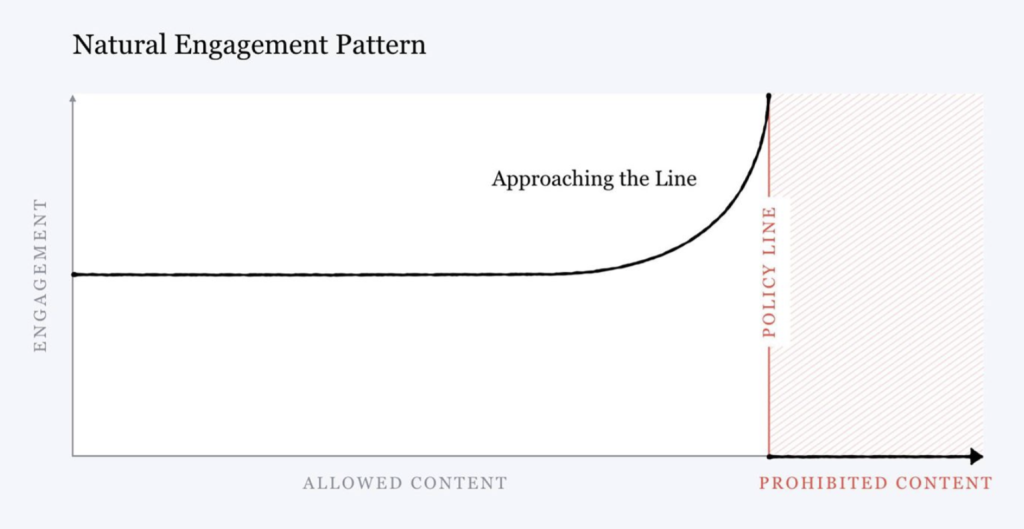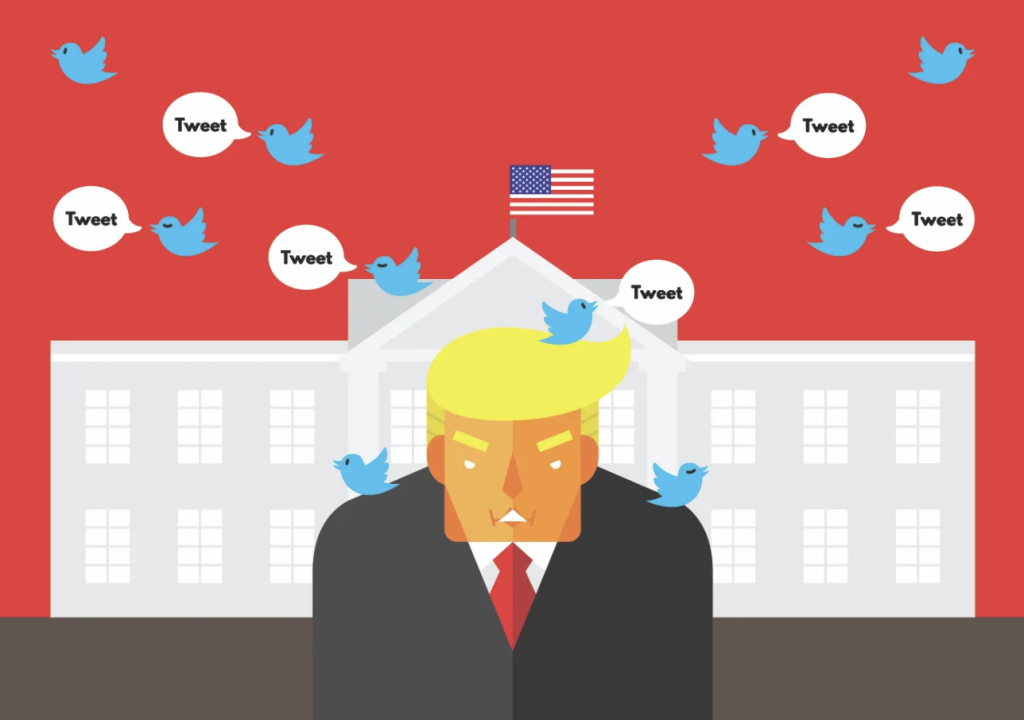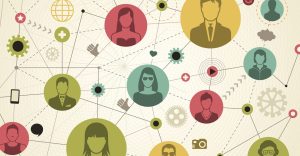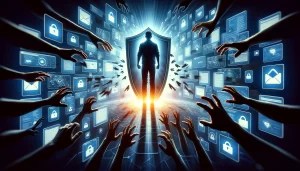
Today’s social media is saturated with internet bots, cyberbullying, and fake news which are intricately tied to real-world consequences. With artificial intelligence (AI) largely governing interactions on these platforms, the influence of social media on politics, human interactions and societal perspectives has become much more apparent, especially in causing a public divide. To combat this, we propose identifying who owns an account using government IDs. Compelling users to authenticate their identities on social media platforms could be an important solution in addressing societal issues exacerbated by AI and help promote transparency and accountability among users and social media companies. This proposition challenges the norms of online anonymity and the discussion surrounding freedom of expression, privacy concerns, and the pressing need for accountability in the digital realm.
Social Media, Polarization and Politics
Political polarization online is an issue influenced by numerous factors and is characterized by diverse dissenting perspectives. Nevertheless, there is a consensus that a significant contributor to polarization is the migration of traditionally offline communities onto social media platforms, a trend greatly accelerated by the impact of the COVID-19 pandemic. No matter what a person’s interest is, be it skincare, politics, or Stanley cups, they will be able to find a digital community. At first glance, this seems harmless and beneficial for solving issues like loneliness, but the nature of online interactions often tends toward superficiality. This is exacerbated by AI algorithms shaping content recommendations to maximize user engagement. Pursuing heightened engagement creates a self-reinforcing mechanism, gradually pushing communities toward extremes [1][2]. Over time, what was once considered normal evolves, and extremes become the new standard.

This phenomenon not only drives hyperconsumption in interest-based communities but also has the potential to politically radicalize individuals [3]. For instance, in consumption communities like skincare, users may feel compelled to acquire an increasing number of products and constantly discover novel ways to use them to garner attention [4]. Similarly, in political discourse, the most extreme opinions tend to attract the most attention, prompting a continued escalation where each succeeding viewpoint must surpass the last to maintain a comparable level of engagement. Compounding this are AI based personal recommenders, which construct filter bubbles around each user. This creates separate social media realities and limits users’ exposure to diverse perspectives [5]. By reinforcing existing biases and isolating those with differing viewpoints into separate communities, recommender tools drive polarization [6]. Moreover, they often promote inaccurate info and misinformation as users resonate and engage with content emotionally which often outweighs factual reliability [7].
Requiring identification could address these issues by fostering greater user accountability, encouraging mindful information sharing, and curbing the spread of misleading content. This shift may also mitigate polarization, as users may be less inclined to engage in aggressive or polarized behavior when their real names are attached to their online actions. There are arguments to be made regarding the benefit of anonymity online, but do these benefits outweigh the negative consequences?
The impact of anonymity
On the individual level, anonymity protects users and their privacy, enabling them to share their thoughts and experiences without exposing personal information. It promotes freedom of expression, creating an environment where users can openly share their opinions. However, it simultaneously exposes users to cyberbullying and harassment, as individuals feel encouraged to engage in harmful behavior without accountability [8][9]. Cyberbullying, hate speech and harassment disproportionately affect marginalized groups which are often the exact groups that seek the internet to express themselves to avoid real world harm [10]. Unfortunately, reporting or blocking anonymous users are often insufficient protection tools.
Concerns have been raised that mandating identification may encroach on the right to free speech and drive political discourse into darker unregulated corners of the internet. Despite the absence of an identification requirement, this trend is already visible. Extremist users, feeling constrained on mainstream platforms, have migrated to alternative spaces like Telegram groups [11][12]. Yet, they still exploit social media and its filter bubbles as recruiting tools. Freedom of expression is an important right but it is not absolute [13]. Hate speech and harassment are considered punishable offenses offline and the same is true on social media; each site has content they consider prohibited. Nevertheless, online consequences are much less severe despite the offense having the same negative impact.
On a societal level, anonymity empowers users to speak out against injustice which is vital in oppressive regimes or situations where discrimination is a concern. Notable examples of this were the Arab Spring and more recently, the protests in Iran [14][15]. For whistleblowers and activists, anonymity is essential for exposing wrongdoing and advocating for social change without risk. But whether social media is a positive influence on democracy is doubtful [16][17]. The manipulation of public opinion via social media is a growing threat worldwide. Specifically, internet bots play a significant role in manipulating political content [18]. The scale of the issue is distinguishable in the last week of the 2016 US presidential elections, with an estimated 19 million active bots. These bots operate with specific but hidden goals set by individuals or organizations and employ tactics such as spreading fake news to influence public opinion. The pollution of political discourse by bots is evident globally. According to reports, governments, public relations firms, and political parties are producing misinformation on an industrial scale [19]. This is only possible since social media accounts can be generated by millions in minutes. Requiring identification would make it much harder to influence public opinion through sheer numbers.

Moreover, activism online is not inherently beneficial and benevolent, as evident in the case of Myanmar. Fake news about the country’s Muslim minority were dressed up as social activism and once these posts spread they resulted in political upheaval and genocide [20]. The deliberate act of spreading falsehoods on social media causes public distrust over time [21]. Fueled by manipulating citizens through faulty information, this form of propaganda jeopardizes the democratic ideals of informed decision-making and the “right to know”. This is in direct opposition to the idea that anonymity online benefits democracy by giving everyone a voice. The quality of political discourse and the ability to engage in meaningful political activism in an environment polluted by bots and misinformation are highly questionable [22]. Furthermore, social media companies do not safeguard political discussions; instead, they cooperate with oppressive regimes and use AI to censor “undesirable” content to gain or maintain market access [23][24]. As social media companies aim to grow, this trend is expected to increase.
Political extremism and harassment continue to exist offline and online but offline people are not protected by anonymity. Requiring identification could allow the persecution of those who post harmful content like graphic violence or non-consensual pornography [25]. By employing real-world identities, online platforms align with existing legal frameworks, removing subjective rules set by platform owners. While the choice of which country’s laws to apply is beyond the scope of this article, real identities not only make users legally accountable but also afford them the protections established by their respective governments [26]. These legal protections could also extend towards issues like data ownership by making it possible to attribute the data generated on a social media account to a specific legal individual.

Naturally, identification raises security and privacy concerns. However, it’s worth noting that many users unknowingly provide personal information or engage in activities that already enable the tracing of their online data back to their real-world identity [27][28]. Despite promises of anonymity social media often only offers pseudonymity, leaving users vulnerable to privacy risks. The implementation of identification measures has the potential to foster accountability, but it requires robust safeguards to protect users. Efforts should also focus on empowering users with greater control over their own data. Transparency in how user data is handled and strict adherence to data protection regulations are integral components of this process. While identification introduces valid security and privacy concerns, it also offers an opportunity to establish a more responsible and secure online environment.
What’s next?
The trend of polarization and manipulation of political discourse online is growing yearly; if we compare social media to a public square, it is in dire need of cleanup. Change is imperative, and identification can be a tool to hold individuals, groups, and platforms accountable.
Moreover, a shift in how we perceive social media is necessary. We currently treat it as very personal and the idea of having our names attached to such a private thing is repulsive to us. But we need to internalize that social media has never been and will never be private. Despite our inclination to treat it as a personal space, posting is comparable to shouting in public; everything is audible, and platform owners meticulously record every action. The impact of online statements, amplified by AI tools, surpasses real-life interactions by several magnitudes. However, the consequences for online behavior remain disproportionately low.
The perceived benefits of online anonymity are outweighed by the negative consequences, and a move towards greater accountability could lead to a more balanced and constructive online environment.

